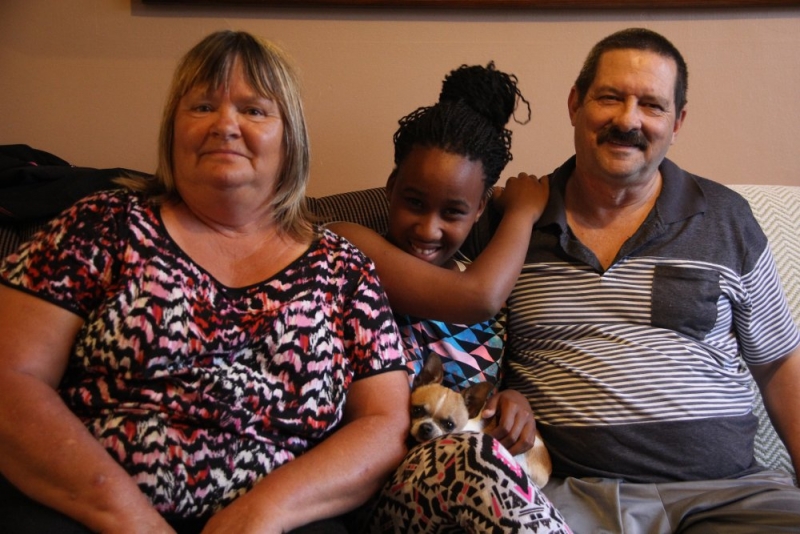After the De Waal Drive threats, tenants in Plumstead fear for the future

The plight of the De Waal Drive families threatened with removal by the Western Cape Department of Human Settlements struck a chord with many Capetonians. But the same process is happening, away from public scrutiny, in other parts of the city, writes Daneel Knoetze of Ndifuna Ukwazi.
On a cloudy Tuesday afternoon in November, about 100 government tenants at Plumstead’s Naruna Estate huddled on the pavement outside Springfield library and community hall. Most were of retirement age. Some were disabled and in wheelchairs. Their placards and slogans lent an air of militancy to what could otherwise have been a muted event: “Hell no, we won’t go!” and “Hands off Naruna!” Passing cars hooted, flashed their lights and one elderly driver inched by with a fist raised from the window in support.
Inside, Human Settlements MEC Bonginkosi Madikizela was being confronted by Karen Saligee, the tenants’ newly elected chairwoman. She and her committee had waited weeks for this meeting. Before they and the MEC had wrapped up, the doors swung open and tenants, tense but quiet, shuffled in.
Madikizela had come “to set the record straight,” after weeks of door-to-door visits during which his officials had quietly tried to convince Naruna’s tenants to accept relocation to Pelican Park, a housing development on the southern fringes of the Cape Flats.
“The concerns coming from the committee members, and I think that they are valid concerns, are that public participation was not done correctly, and that is why there is so much confusion. That is why there are so many mixed messages,” he said.
“We need to go back and make sure that we start a public participation process that will take everybody into confidence. And I did commit myself to that particular process.”
But, he said, the arrears in rentals were unsustainable for the department. Families who accept that they cannot afford the rent (25 percent of household income) — poor families — can have their debt scrapped and receive subsidised homes — if they move to Pelican Park. It is an offer that government considers reasonable, but one which tenants, many of whom have lived in their homes for decades, have been loath to accept.
Naruna Estate, a low density, working-class area dotted with 156 government rental houses, may be what many city architects would consider a textbook case of “sprawl” and inefficient urban design. But for residents it is a well located area – a better alternative to the ghettos and shack settlements where most of Cape Town’s other low-income families make their homes. By those standards, Plumstead is a haven. There are play parks and tree lined streets, with railway stations and other amenities nearby.
The same applies to other rental properties where tenants received similar “offers” from the department this year – at De Waal Drive, Rugby, Sanddrift in Milnerton and Mandarin Court in Gardens.
“I have two things to raise,” one Naruna tenant said when the meeting opened for questions. He gave his name, but later asked to be quoted anonymously for fear of reprisal.
“Firstly, Minister, you say that you will participate with us on this decision, but it seems to me that the decision has already been made. So what is the point in the participation you propose? Secondly, with regards to the arrears issue, it takes two to tango! Why have your officials not kept up their end by staying in touch with people as they fell behind, instead of bringing this down on everyone all at once?”
By the Department’s count, 99 families in Naruna Estate are in arrears, with the debt amounting to more than R2 million. Among them are Mike and Cathy Rightford who live in a modest two bedroom home with a tiny garden in Dragoon Street.
Cathy Rightford says she owes the department R8,000. But, like other tenants, she says, she can explain this.
In March 2013, Mike Rightford’s right leg was amputated at the groin. He had undergone a successful heart operation, but the entry wound of a drip went septic and the limb could not be saved. Over a few weeks this father of two foster children, a toolmaker by trade, lost his job and freedom of movement.

The family could not keep up their rent payments until the rental was adjusted and Mike Rightford’s pension payments started.
In other instances, Cathy Rightford suspects, arrears are improperly calculated by the department – accounting for the huge collective debt.
“Just because we are in arrears does not mean we are bad tenants, and that goes for many people around here, who all have their own reasons,” she says, adding that she’s now paying her arrears off in instalments.
“People are poor, and they struggle month to month. But if there was better communication from the department, I’m sure most people would make a commitment to be better with their payments. It is not fair that the department only arrives at our doors now to threaten, instead of offering to work things out with us.”
This year, Mike and Cathy Rightford petitioned the department to make the necessary alterations for the home in which they have lived for 23 years to become disabled friendly. In July, the work was approved and contractors renovated the bathroom, replaced the tiny steps at the front door with a ramp and re-paved the driveway. Mike Rightford spends most of his time indoors, but now he can accompany his adopted daughter Amy, who has Down syndrome, to the gate from where a bus ferries her to a special needs school in Diep River. The family may be poorer now (Mike Rightford’s pension comes to around R3,200 a month), but the proximity of Plumstead’s schools, shops and a day hospital, where he gets chronic medication, has softened the blow.
“We were so grateful when the renovations were done. It made life so much better for all of us, because Mike could be more independent,” says Cathy Rightford.
“So these new rumours have come as a shock. It seems rather cruel. We got the improvements to our house, only to be told that we are no longer welcome here. That our home is better suited to another family.”
Throughout 2015, the department’s intentions for its rental properties have been mired in controversy, confusion and hearsay. The department refers to a document called the new Rental Housing Policy. But requests – via phone calls and emails to, among others, the MEC’s spokesman – for access to this have been met with referrals, promises to respond and ultimately silence. In the absence of documented information about their future, tenants have been left to decode the changing messages from department officials and rumours from the neighbours.
The Minister has insisted that his department will not evict anyone. But If tenants refuse to move to Pelican Park, as many have done, that may be the only legal way for the department to recover its property. Even so, says Socio-Economic Rights Institute director Stuart Wilson, arrears alone are not necessarily sufficient grounds for an eviction order, especially if the department fails to prove that accounts were properly managed and that the arrears were properly calculated.
It all started at an April meeting between officials and tenants at De Waal Drive rental flats. The 90 semi-detached units close to the city centre are some of the best located low income housing in Cape Town. At the meeting and the door-to-door visits which followed, officials came out with a strong and threatening message: the new rental policy would require tenants to pay market-related rentals or accept relocation to Pelican Park. Around ten tenants agreed to move, but most of these have changed their minds and decided to stick it out with their neighbours.
“We agreed to move to Pelican Park, because we were afraid,” says Margaret O’Brien, who lives with her husband, adult daughter and three grandchildren at number 25 De Waal Drive.
“This arrears issue felt threatening. When they said that they would scrap our debt and give us another place for free, it seemed like an okay option. But, when time came to sign for the house everything changed. It is a subsidised house, but there are many conditions for moving in. It is not like it is yours, just like that. And the houses there in Pelican Park are not properly finished. They are too small for our family. There are no geysers and the walls and floors are just raw.”
De Waal Drive residents’ resolve to resist the relocations was partly thanks to support from the wider Cape Town community, according to the residents’ committee.
But, there was less focus and support when these threats spread to tenants in the department’s other rental properties.
At a September meeting with Plumstead tenants, says Saligee, officials said that “all” families in the income category R0 – R3,500 were told to move to Pelican Park.
“This was a very inappropriate way of going about things, it cannot be called public participation,” she says, echoing frustrations expressed by many tenants at De Waal Drive in April.
“How can the department make a decision about our futures without even the slightest input from us and without a central document explaining the changes? Then, when people complain, they try to get tenants to accept it by threatening and intimidating us one by one. People are afraid and do not know what this means.”
That is why the MEC’s commitment for a fresh public participation process to start has struck a chord with Saligee and other tenants. But, she says, this must translate into a single and transparent process, one which breaks from the Department’s attempts to pick families off one by one through door-to-door visits and veiled threats.
Daneel Knoetze works at Ndifuna Ukwazi and has been providing research support for tenants at Naruna Estate and De Waal Drive. Views expressed are not necessarily GroundUp’s.
Support independent journalism
Donate using Payfast

Don't miss out on the latest news
We respect your privacy, and promise we won't spam you.
Next: Gangsters rob fire victims
Previous: Dispute over who represents residents of informal settlement
© 2016 GroundUp. 
This article is licensed under a Creative Commons Attribution-NoDerivatives 4.0 International License.
